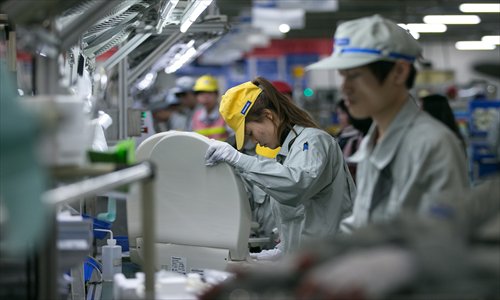
Staff work on toilet lids at Panasonic Home Appliances (Hangzhou) Co in East China’s Zhejiang Province. File Photo: VCG
Since as early as US President Donald Trump came into power in 2017, there have been persistent calls from US officials for companies to shift production out of China. Those calls have recently intensified in the wake of the coronavirus pandemic and appear to have gained support from Japanese officials, who plan to pay firms billions of dollars to leave China.
However, latest data from Chinese officials show that while foreign investment in China fell during the first quarter, there are signs of improvement and clear signals that many foreign investors in certain areas are increasing investments rather than pulling back.
And it could take much more than just empty talk and even some cash to make profit-seeking investors turn a blind eye to the very reasons they chose China in the first place - the massive market, complete industry chain and so on, a former senior Chinese official said.
In the first quarter of the year, foreign investment in China fell by 10.8 percent year-on-year to 216.19 billion yuan ($30.61 billion), according to the Chinese Ministry of Commerce (MOFCOM) on Wednesday. The drop is very sharp; however, it is worth pointing out that this came on the heels of the coronavirus pandemic, when the entire country was in a near standstill for weeks.
But as the domestic epidemic waned, foreign investment also improved. In March, total foreign investment fell by 14.1 percent on a year-on-year basis, but that's an improvement of 11.5 percentage points from the decline in the first two months, the MOFCOM said. That does not include investments in financial sectors.
The high-tech industry was particularly popular among foreign investors, with total investment in the sector increasing 15.5 percent year-on-year. Specifically, total foreign investment in the professional and technical services sector jumped 95 percent year-on-year.
The data came after the Japanese government last week issued a plan to set up a $2.2 billion fund to help its companies shift production back to Japan or elsewhere from China. On the same day, Larry Kudlow, director of the White House National Economic Council, also suggested that the US government should "pay the moving costs" of US companies that want to move out of China.
The moves raised suspicions of a concerted effort by the US and Japan to undercut China's economic rise and concerns that such an effort could cause the "collapse" of China's ability to attract foreign investments and deal a major blow to the Chinese economy.
However, Wei Jianguo, a former vice commerce minister of China, does not see it that way.
"Foreign-funded companies have made contributions to China becoming the world's second-largest economy and the biggest destination for foreign investment. They brought in capital, technology, management and equipment. But China's development did not rely solely on 'charity' from US and Japanese companies," Wei told the Global Times on Wednesday.
Wei, who is now the vice chairman of the Chinese Center for International Economic Exchanges, pointed out that China has a middle-income population of 400 million, and US and Japanese companies will "definitely regret it" if they leave behind the Chinese market and a complete supply chain.
"The trend remains that the Chinese economy will continue to grow in the coming decades and China will become the world's largest consumer market. We are fully confident about this and that more and more companies from Europe, the US, Japan and South Korea will continue to value this fast-developing market," he said.
Still, there is also a growing trend that more and more manufacturing companies, including Chinese firms, have shifted some production lines to countries in Southeast Asia such as Vietnam, Indonesia and Myanmar, where labor costs are relatively lower.
However, the coronavirus pandemic has also revealed how much these relocated productions still depend on China for everything from material and equipment and even skilled workers, as many were forced to partially shut down because supplies of these essentials were cut off.
For example, China had to dispatch cargo planes to transport materials to Myanmar to help local garment factories reopen.
Apart from a complete industry chain, where you can find almost anything for production of a wide range of products, China's business climate has also been improving in recent years and will further improve, with a slew of new laws and regulations, Wei pointed out.
In 2019, China was ranked 31st in the World Bank Group's global business climate ranking, up from 46th in 2018 and 78th in 2017. The Washington DC-based multilateral lender also ranked China among the top 10 best improvers for a second consecutive year.


